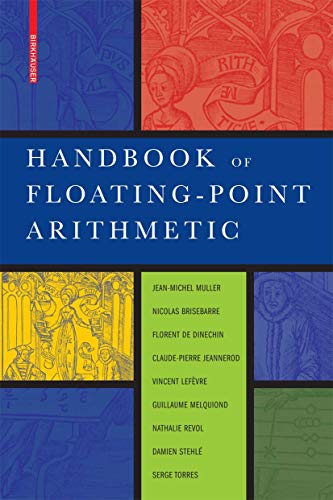Verwandte Artikel zu Handbook of Floating-Point Arithmetic

Inhaltsangabe
Floating-point arithmetic is the most widely used way of implementing real-number arithmetic on modern computers. However, making such an arithmetic reliable and portable, yet fast, is a very difficult task. As a result, floating-point arithmetic is far from being exploited to its full potential. This handbook aims to provide a complete overview of modern floating-point arithmetic. So that the techniques presented can be put directly into practice in actual coding or design, they are illustrated, whenever possible, by a corresponding program.
The handbook is designed for programmers of numerical applications, compiler designers, programmers of floating-point algorithms, designers of arithmetic operators, and more generally, students and researchers in numerical analysis who wish to better understand a tool used in their daily work and research.
Die Inhaltsangabe kann sich auf eine andere Ausgabe dieses Titels beziehen.
Von der hinteren Coverseite
Floating-point arithmetic is by far the most widely used way of implementing real-number arithmetic on modern computers. Although the basic principles of floating-point arithmetic can be explained in a short amount of time, making such an arithmetic reliable and portable, yet fast, is a very difficult task. From the 1960s to the early 1980s, many different arithmetics were developed, but their implementation varied widely from one machine to another, making it difficult for nonexperts to design, learn, and use the required algorithms. As a result, floating-point arithmetic is far from being exploited to its full potential.
This handbook aims to provide a complete overview of modern floating-point arithmetic, including a detailed treatment of the newly revised (IEEE 754-2008) standard for floating-point arithmetic. Presented throughout are algorithms for implementing floating-point arithmetic as well as algorithms that use floating-point arithmetic. So that the techniques presented can be put directly into practice in actual coding or design, they are illustrated, whenever possible, by a corresponding program.
Key topics and features include:
* Presentation of the history and basic concepts of floating-point arithmetic and various aspects of the past and current standards
* Development of smart and nontrivial algorithms, and algorithmic possibilities induced by the availability of a fused multiply-add (fma) instruction, e.g., correctly rounded software division and square roots
* Implementation of floating-point arithmetic, either in software on an integer processor or hardware, and a discussion of issues related to compilers and languages
* Coverage of several recent advances related to elementary functions: correct rounding of these functions and computation of very accurate approximations under constraints
* Extensions of floating-point arithmetic such as certification, verification, and big precision
Handbook of Floating-Point Arithmetic is designed for programmers of numerical applications, compiler designers, programmers of floating-point algorithms, designers of arithmetic operators, and more generally, students and researchers in numerical analysis who wish to better understand a tool used in their daily work and research.
„Über diesen Titel“ kann sich auf eine andere Ausgabe dieses Titels beziehen.
Gebraucht kaufen
Zustand: Gut bis sehr gutEUR 29,75 für den Versand von USA nach Deutschland
Versandziele, Kosten & DauerNeu kaufen
Diesen Artikel anzeigenEUR 25,50 für den Versand von USA nach Deutschland
Versandziele, Kosten & DauerSuchergebnisse für Handbook of Floating-Point Arithmetic
Handbook of Floating-Point Arithmetic
Anbieter: Great Matter Books, Grand Rapids, MI, USA
Hardcover. Zustand: Near Fine. No Jacket. Near Fine condition hardcover book, no dust jacket. Slightest shelf wear to covers and spine, slightly more wear to spine than to covers. Slightest bumping to spine edges. Slightest smudging to text block edges. Minute toning to text block edges. Hinges stiff from lack of use. All books are individually inspected and described. Never X-Library unless specifically described as such. Bestandsnummer des Verkäufers 2501-9500
Anzahl: 1 verfügbar
Handbook of Floating-Point Arithmetic
Anbieter: Toscana Books, AUSTIN, TX, USA
Hardcover. Zustand: new. Excellent Condition.Excels in customer satisfaction, prompt replies, and quality checks. Bestandsnummer des Verkäufers Scanned081764704X
Anzahl: 1 verfügbar
